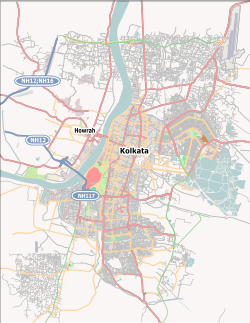Ward No. 22, Kolkata Municipal Corporation
| Ward No. 22 | |
|---|---|
| Kolkata Municipal Corporation | |
| Coordinates: 22°35′13″N 88°21′06″E / 22.586861°N 88.351667°ECoordinates: 22°35′13″N 88°21′06″E / 22.586861°N 88.351667°E | |
| Country |
|
| State | West Bengal |
| City | Kolkata |
| Neighbourhoods covered | Posta |
| Parliamentary constituency | Kolkata Uttar |
| Assembly constituency | Jorasanko |
| Borough | 4 |
| Population (2011) | |
| • Total | 15,730 |
| Time zone | IST (UTC+5:30) |
| PIN | 700 007 |
| Area code(s) | +91 33 |
Ward No. 22, Kolkata Municipal Corporation is an administrative division of Kolkata Municipal Corporation in Borough No. 4, covering parts of Posta neighbourhood in north Kolkata, in the Indian state of West Bengal.
Attempts were made to establish a municipal corporation at Kolkata from the middle of the 19th century. The electoral system was introduced for the first time in 1847, and 4 of the 7 board members were elected by the rate payers. In 1852 the board was replaced by a new one and in 1863 a new body was formed. As per old records, in 1872 there were 25 wards in Kolkata (spellings as in use at that time) – 1. Shyampukur, 2. Kumartuli, 3. Bartala, 4. Sukea Street, 5. Jorabagan, 6. Jorasanko, 7. Barabazar, 8. Kolutola, 9. Muchipara, 10. Boubazar, 11. Padmapukur, 12. Waterloo Street, 13. Fenwick Bazar, 14. Taltala, 15. Kalinga, 16. Park Street, 17. Victoria Terrace, 18. Hastings, 19. Entali, 20. Beniapukur, 21. Baliganj-Tollyganj, 22. Bhabanipur, 23. Alipur, 24.Ekbalpur and 25. Watganj. A new municipal corporation was created in 1876, wherein 48 commissioners were elected and 24 were appointed by the government. With the implementation of the Municipal Consolidation Act of 1888 the area under the jurisdiction of the municipal corporation was enlarged. Certain areas were already there but more parts of them were added (current spellings) - Entally, Manicktala, Beliaghata, Ultadanga, Chitpur, Cossipore, Beniapukur, Ballygunge, Watganj and Ekbalpur, and Garden Reach and Tollygunj. The Calcutta Municipal Act of 1923 brought about important changes. It liberalised the constitution along democratic lines.
The state government superseded the Corporation in 1948 and the Calcutta Municipal Act of 1951 came into force. Adult franchise was introduced in municipal elections in 1962. With the addition of certain areas in the southern parts of the city, the number of wards increased from 75 to 144.
Ward No. 22 is bordered on the north by the Port Trust’s road leading from the Hooghly River bank to Kalikrishna Tagore Street and Darpa Narayan Tagore Street; on the east by Jadulal Mallick Road, Jogndra Kaviraj Row, Kalakar Street and Jag Mohan Mullick Street; on the south by the Port Trust’s road leading from Mahatma Gandhi Road and Cotton Street to the Hooghly River Bank; and on the west by the Hooghly River and Maharshi Devendra Road.
...
Wikipedia

